‘A candidate straight out of 2013’: Nikki Haley ran a pre-Trump campaign in a post-Trump Republican party

Eight candidates appeared on the stage for the first Republican primary debate in August. All had entered the race assuming that Donald Trump could be beaten; that his hold of the party’s base had been – or could be – loosened. They were all wrong.
The only woman in that race would become the last candidate standing for any Republican voter who didn’t want to return to a bombastic showman with 91 criminal counts and a litany of sexual assault allegations to his name.
Nikki Haley dropped out of the presidential race this morning, after she only managed to win Vermont on Super Tuesday. Fourteen races have been called in favour of Trump, who took the stage at Mar-a-Lago to declare victory.
After making no appearance on Tuesday, Haley spoke in Charleston today.
“Just over a year ago, I launched my campaign for president,” she said. “When I began, I said the campaign was grounded in my love for our country. Just last week, my mother, a first-generation immigrant, got to vote for her daughter for president. Only in America. I am filled with gratitude for the outpouring of support we've received from all across our great country. But the time has now come to suspend my campaign.”
She added that she would still stand up for what she believes in: “Our national debt will eventually crush our economy. A smaller federal government is not only necessary for our freedom; it is necessary for our survival. The road to socialism is the road to ruin for America.”
“Term limits for Washington politicians are needed now more than ever,” Haley also argued. “Our world is on fire because of America's retreat. Standing by our allies in Ukraine, Israel and Taiwan is a moral imperative. But it's also more than that. If we retreat further, there will be more war, not less.”
“In all likelihood, Donald Trump will be the Republican nominee when our party convention meets in July. I congratulate him, and wish him well,” she said.
But she declined to endorse the former president.
“I have always been a conservative Republican and always supported the Republican nominee,” she concluded. “But on this question, as she did on so many others, Margaret Thatcher provided some good advice when she said, ‘Never just follow the crowd. Always make up your own mind.’”
Haley left the governor’s mansion on Richland Street in Columbia, South Carolina, to become Trump’s UN ambassador in January 2017. She held that position until December 2018, and jumped into the race to take on her former boss just over four years later. Not to take him on directly, of course. Trump declined to participate in any of the debates, seemingly believing that anything but a coronation was downright offensive.
First woman governor to run for the top job
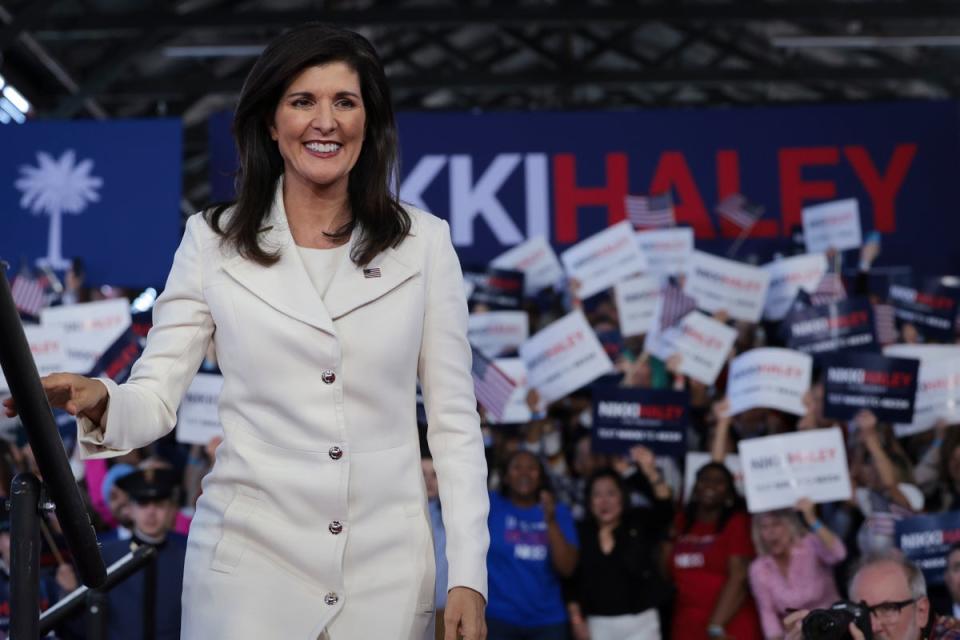
When she announced her run on February 14, 2023, Haley became the first woman of colour to be a major candidate for the Republican nomination and the first woman governor to run for the top job.
David Darmofal is the vice chair of the political science department at the University of South Carolina in downtown Columbia.
“The problem that Haley has is that she is going up against the base of the Republican Party, which is firmly committed to former President Trump,” he told The Independent on February 7, a few weeks before Ms Haley left the race. “She actually had many of those supporters back in 2010, when she first ran as an insurgent candidate [for South Carolina governor] through the help in part of former Governor Sarah Palin’s endorsement, but those voters then became Trump’s base.”
“He became the dominant figure, and he obviously dominated American politics altogether. So I think it’s more about Trump than it is about Haley,” he added.
‘I’m not sure how much hope she ever had’
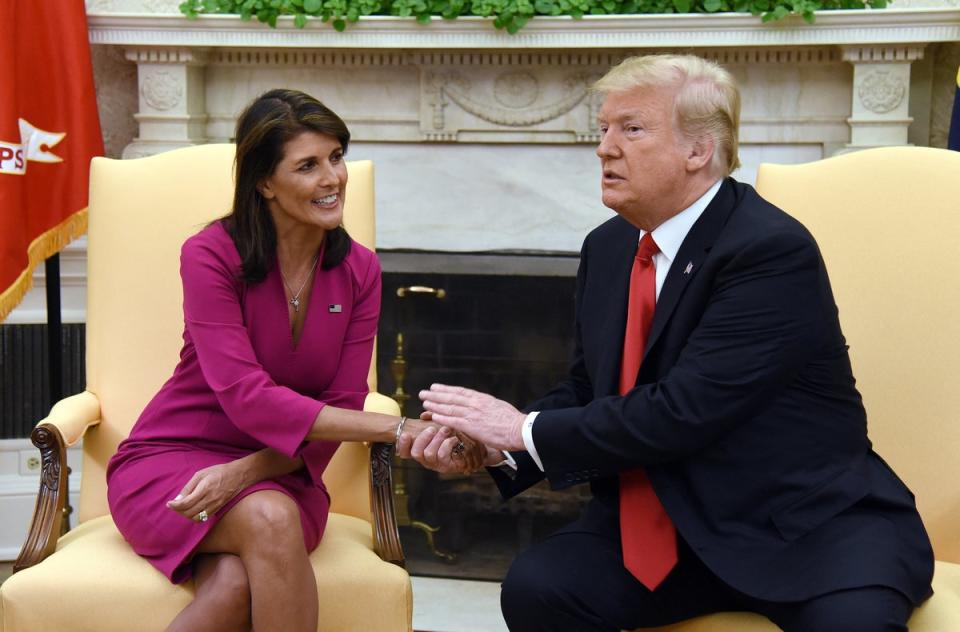
Oren Cass worked on Mitt Romney’s 2008 and 2012 campaigns for president. In 2020, he founded the group American Compass “to think about what the post-Trump right-of-centre is going to be,” he told The Washington Post at the time.
“I’m not sure how much hope she ever had. She seems to have been running a very second-place campaign from the start,” he told The Independent on February 13, adding that Haley’s message and agenda didn’t fit “at all with what certainly the base of the Republican Party for the nation more broadly is concerned about and focused on and believes in. It’s not a very good recipe for political success”.
Yet, she garnered attention for her strong debate performances. Support for Haley grew from 4 per cent on the day she launched her campaign in February last year to 17.1 per cent as of February 20 in FiveThirtyEight’s national GOP primary polling average.
But during that same time, Trump went from 43.8 to 77.7 per cent. And Haley’s 17.1 per cent ended up being her peak — it started slowly going down from there.
Looking at that early polling, it seems clear why some may have thought there was an opening to take on Trump: more than half the party appeared to be searching for an alternative. But as the former president faced indictment after indictment last year, the base rallied around him, and that opening slammed shut, looking unlikely to open again any time soon.
The de facto leader of the party
“I think early on [in] the primary process, or even last year, before the primary started, there were a lot of different theories about how strong a candidate Trump was going to be,” Cass notes. “What has turned out to be the case is that he is much closer to an incumbent as the sort of de facto leader of the party, even though he’s not currently in office.”

“A lot of people chose not to run at all against him. But those who did I think assumed it would have more of a dynamic of an open primary with a lot of people who were initially undecided. And that turned out not to be the case,” he adds.
Haley managed to gather the non-Trump wing of the party – but that part of the GOP turned out to be much smaller than initially thought.
Her support grew steadily in the months leading up to the first contest in Iowa, particularly through her sparring with anti-woke author and biotech entrepreneur Vivek Ramaswamy and Florida governor Ron DeSantis, both of whom endorsed Trump after dropping out.
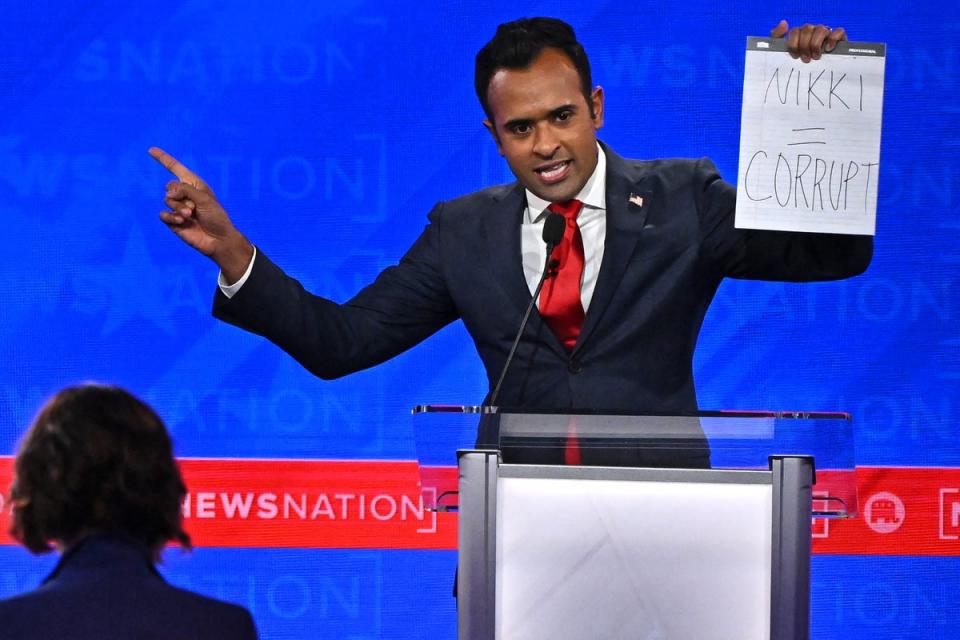
Top officials in her home state of South Carolina, such as Governor Henry McMcMaster and Senator Tim Scott — whom Haley appointed to the Senate and who previously dropped out of the presidential race — backed Trump, which was a blow to the Haley campaign. Some saw their doing so as a cynical attempt to elevate themselves for jobs in a possible second Trump administration in January 2025.
Ron DeSantis campaigned hard in Iowa, but Haley came within just two points of him in the state. When he left the race after that initial loss in the caucuses, Haley finally had the two-person race she always wanted. In New Hampshire, she hung on to Trump, ending up just over 11 per cent behind him after the former president had won the Iowa caucuses by 30 points. But the electorate and voting rules in the Granite State were some of the friendliest territory Haley was set to face this primary cycle.
Kind words when people drop out – white-hot rage when they do not
Trump, who shared uncharacteristically kind words about DeSantis and Ramaswamy after they dropped out, appeared to have allowed Haley to get under his skin when she declined to do the same after his New Hampshire win.
“Who the hell was the imposter that went up on the stage — that went before and claimed victory?” Trump said after Haley’s speech. “She didn’t win, she lost. She did very poorly actually.”
Haley didn’t claim victory – in fact, she congratulated Trump on winning — but Trump’s eagerness to lash out against her indicated that she was in his head.
“I wonder if she and [Florida Governor Ron] DeSantis and other candidates didn’t realize how strong the connection was still between Trump and Republican voters even after January 6 and the like,” Darmofal says. “They may have made a miscalculation, thinking that he would not be as strong as he would be.”
‘The Trump side is much, much, much, much bigger’
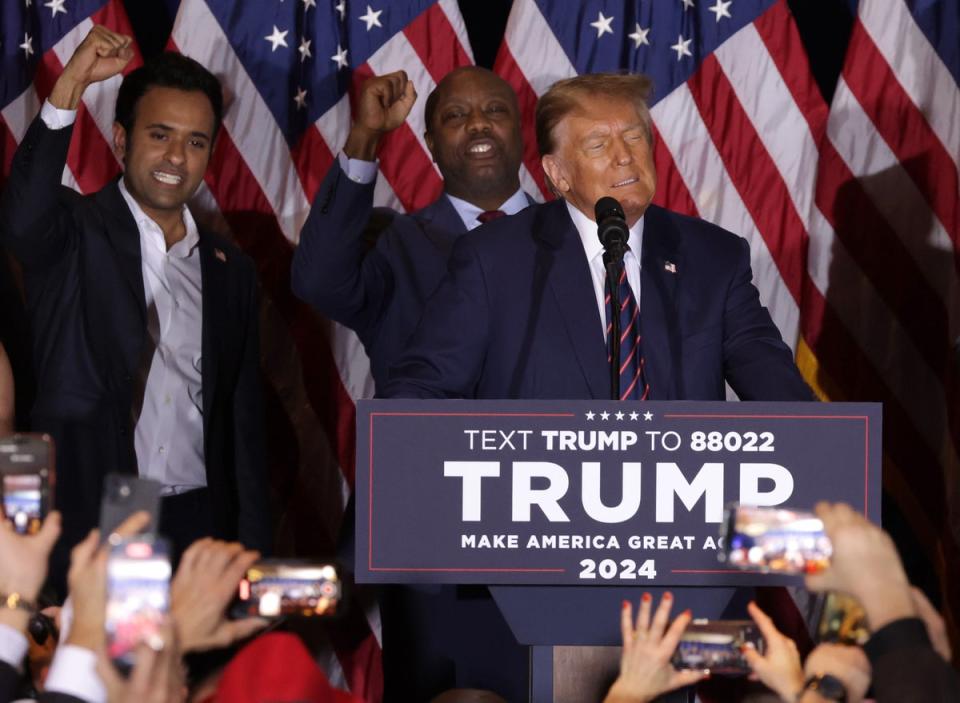
“I think she clearly did consolidate the anti-Trump wing … That’s obviously just not a very big wing,” Cass says. “You had these folks who really just want to go back to 2013, pushing to get a Haley/Trump match-up, who completely misunderstood the dynamics of the party. In a Trump versus anti-Trump matchup, the Trump side is much, much, much, much bigger. This isn’t 2016 when … a one-on-one early on probably beats Trump.”
“Some people are saying that it’s because of the indictments of him that he grew in popularity. I don’t necessarily believe that,” Darmofal adds. “DeSantis was originally the closest Trump-like candidate as an alternative to Trump and DeSantis just showed himself to be a particularly weak candidate in terms of personal appeal.”
Weeks ahead of the end of the Haley campaign, Cass told The Independent, “It seems pretty clear also from the way that she is continuing to run, that she is offering herself more as the most plausible alternative if something should happen to Trump, as opposed to somebody who actually thinks she can beat Trump”.
“It certainly is hard to make sense of the campaign she’s continuing to run as one that thinks it could actually prevail in a sort of standard primary season,” he added.
Cass said that the “ship sailed” on running a “full-throated anti-Trump campaign” early in the primary season: “You see her doing that now a little bit. But for the first eight months or so, when … one could have had a plausible path to really going after Trump aggressively – neither Haley nor DeSantis had any interest in doing that – they spent all their time going after each other instead.”
‘A traditional Romney-type Republican’
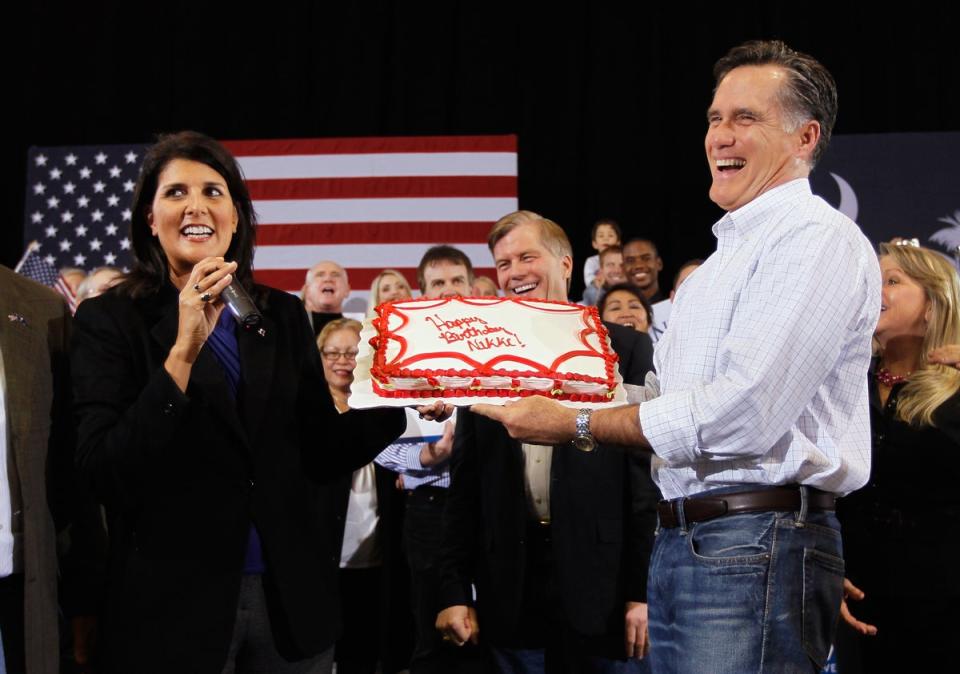
Haley “was always going to be campaigning as someone who would accept election results, a rule-of-law candidate, a person who was also very much in support of a more active, less isolationist foreign policy. And she’s less of an economic populist as well. She’s more of a traditional Romney-type Republican,” Darmofal said.
Mitt Romney — the former Massachusetts governor, 2012 Republican nominee, and outgoing Utah senator, who endorsed Haley in her 2010 race for governor — declined to endorse anyone during the GOP primaries this time around. He noted on NBC’s Meet the Press that his party had left him behind, and added that his public support would now be harmful to any candidate running in a Republican primary.
“If I endorsed them, that would be the kiss of death. I’m not going to do that,” Romney said with a laugh in December. “Shall I endorse the person I like least right now?”
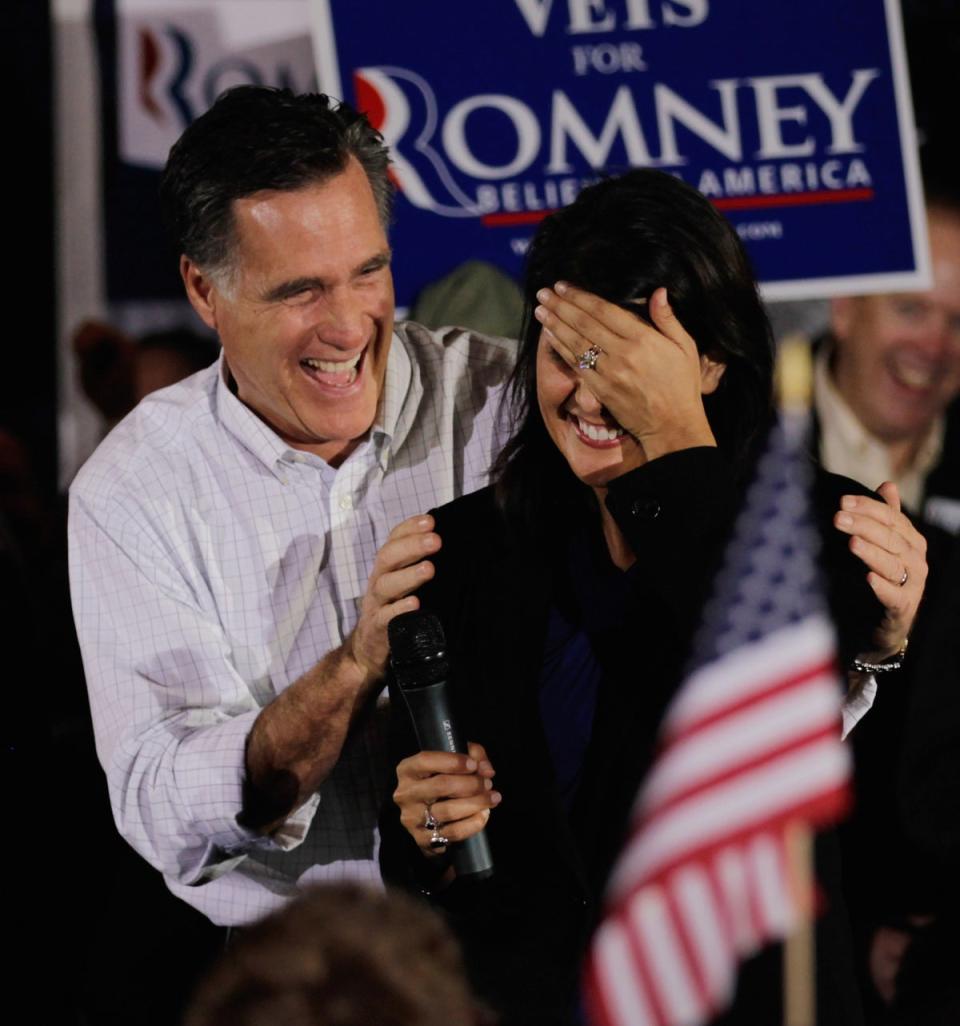
Being a Romney type “was not going to appeal necessarily to a party that was so connected to Trump. So maybe all along, she was going to have problems,” Darmofal says.
Meanwhile, DeSantis made the “serious miscalculation” of “not recognising the personal appeal of Trump and [not realizing that] you couldn’t just mimic Trump”.
‘It was just a donor fantasy’
Cass says the “only plausible path” for victory would have been to run a candidate who appeals to, not pushes away, Trump voters. That candidate could then attempt to get the non-Trump wing “by default” and pull away enough Trump voters to beat the former president.
“That at least was a serious theory of the case,” he argues. “The theory that only people who don’t like Trump and want to go back to the pre-Trump days was going to win a one-on-one matchup was never supported by a shred of poll data from the last eight years. It was just a donor fantasy.”
Cass notes that “the actual places where she has a contrast with Trump – on things like entitlements, immigration, and trade – are all things that she’s on the losing side of. It’s a somewhat embarrassing situation to be in as a campaign where you don’t have any sort of vision or agenda to offer, except in ways that people don’t want.”
‘She would have a better chance of winning a Democratic Party nomination’
Regarding the post-Trump Republican Party of the future, he says that senators “like JD Vance, Marco Rubio, Josh Hawley, Tom Cotton ... easily beat Nikki Haley”.
“It’s because of the actual set of positions she has taken. There’s still that clip of her in the New Hampshire restaurant talking about how we need to open up immigration as much as possible to provide employers with whatever they want,” Cass says. “If you’re still out there saying that, you don’t have a serious claim to be a leader in the Republican Party.”
“Frankly, I think she would have a better chance of winning a Democratic Party nomination,” he adds, arguing that “on the issues that have been in focus … trade, immigration, foreign policy, some of the sort of woke politics-type issues,” Haley would be more acceptable to Democratic base voters than Republicans.
“I’m sure she has all sorts of positions that would also be pretty unattractive to the Democratic base,” he adds, “but … if I were to describe [the issues] Nikki Haley is choosing to make a stand on and then asked you which party’s nomination is she trying to win – I think it would honestly be pretty hard to answer that question.”
The conservative policy impresario tells The Independent that the Haley campaign is an “indictment” of the donor class, who “screams to high heaven that we cannot have Trump”. It was ultimately those donors — and nobody else — who kept her candidacy alive.
“If all they’re willing to actually do is offer Nikki Haley, then they’re clearly not serious about the enterprise. They’re basically saying, ‘We cannot have Trump, but we will not make any concessions on anything that led us to [have] Trump and then we basically just accept that we will continue to lose and lose and scream about it from the sidelines,’” Cass says.
“At the end of the day, she’s a candidate straight out of 2013 and that was never going to work.”


